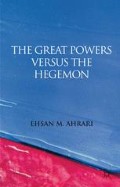Abstract
The best way to summarize the United States’ global primacy from World War II until the administration of President George W. Bush is to state that it was done through a series of highly intricate maneuvers lasting several decades, which included alliance building, soft balancing and selective cooperation. As much as the Bush administration was known for its penchant for unilateralism, it should be noted that it did not have sole monopoly in this behavior. The evolution of this type of strategic maneuver was quite obvious during the presidencies of George H. W. Bush and Bill Clinton, especially in their dealings with Russia, and the North Atlantic Treaty Organization’s (NATO) war against Yugoslavia, as was discussed in Chapter 3. George W. Bush took unilateralism to a new height in his declaration of the so-called global war on terrorism (GWOT), and the unilateral manner in which he decided to invade Iraq, without the sanction of the United Nations (UN), which epitomizes international legitimacy. The reaction of the three great powers of this study to the Bush administration was an increased feeling that the only way they could become influential in determining the shape of global events was through the development of a multipolar global power arrangement. Of the three great powers, the People’s Republic of China (PRC) might be following internal balancing (military modernization) for the purpose of protecting itself from any contingency that would lead to a major skirmish with the United States (US).
Access this chapter
Tax calculation will be finalised at checkout
Purchases are for personal use only
Preview
Unable to display preview. Download preview PDF.
Notes
S. R. Graubard (1973) Henry Kissinger: Portrait of a Mind (NY: W. W. Norton & Company), pp. 6–7.
J. Mann (2004) Rise of the Vulcans: The History of Bush’s War Cabinet (NY: Penguin Books), p. 162;
also see P. E. Tyler (March 8, 1992) ‘US Strategy Plan Calls for Insuring No Rivals Develop’, The New York Times, http://www.nytimes.com/1992/03/08/world/us-strategy-plan-calls-for-insuring-norivals-develop.html.
Excerpts From Pentagon’s Plan: “Prevent the Re-Emergence of a New Rival”’ (March 8, 1992) The New York Times, http://s3.amazonaws.com/911timeline/1990s/nyt030892b.html.
T. Donnelly (September 2000) ‘Rebuilding America’s Defenses: Strategy, Forces and Resources for a New Century’, A Report of The Project for the New American Century, http://www.newamericancentury.org/RebuildingAmericasDefenses.pdf.
B. Woodward (2006) State of Denial: Bush at War Part III (NY: Simon & Schuster), p. 97.
B. Woodward (2002) Bush At War (NY: Simon & Schuster), p. 49.
R. K. Betts (January—February 2003) also makes this point in his ‘Suicide From Fear of Death?’ Foreign Affairs, pp. 34–43,http://www.foreignaffairs.com/articles/58617/richard-k-betts/suicide-from-fear-of-death.
For recent evidence of this point, see P. Tyler (2009) A World of Trouble: The White House and the Middle East — from the Cold War to the War on Terror (NY: Farrar, Straus and Giroux), especially Chapter 9.
P. C. Bobbitt (2002) The Shield of Achilles: War, Peace and the Course of History (NY: Random House), p. 685.
Col Qiao Liang and Col Wang Xiangsui, PLA (September 2002) ‘Unrestricted Warfare: China’s Master Plan to Destroy America’ (Los Angeles, CA: Pan American Publishing Company).
J. Keller (November 2004) ‘An appeal for new emphasis on antisubmarine warfare’, Military & Aerospace Electronics, http://mae.pennnet.com/articles/article_display.cfm?article_id=215443.
The entire discussion of this paragraph is from A. Erickson (2008) ‘Can China Become a Maritime Power?’ in Chap. 5 of T. Yoshihara and J. Holmes, Asia Looks Seaward: The Emerging Dynamics of Regional Sea Power (Westport, CT: Praeger Security International), pp. 70–110.
D. Dombey (April 1, 2009) ‘The US and China: A close–but complex—relationship’, Financial Times, http://www.ft.com/cms/s/0/853549d0-1d88-11de-9eb3-00144feabdc0.html.
K. Hamlin and L. Yanping (August 16, 2010) ‘China Overtakes Japan as World’s Second-Biggest Economy’, Bloomberg News, http://www.bloomberg.com/news/2010-08-16/china-economy-passes-japan-s-in-second-quartercapping-three-decade-rise.html.
C. Zachariahs and R. Harui (August 15, 2010) ‘China Favors Euro Over Dollar as Bernanke Alters Path’, Inforwars.com, http://www.infowars.com/china-favors-euro-over-dollar-as-bernanke-alters-path/.
Copyright information
© 2011 Ehsan M. Ahrari
About this chapter
Cite this chapter
Ahrari, E.M. (2011). The Hegemon’s Maneuvers. In: The Great Powers versus the Hegemon. Palgrave Macmillan, London. https://doi.org/10.1057/9780230348431_6
Download citation
DOI: https://doi.org/10.1057/9780230348431_6
Publisher Name: Palgrave Macmillan, London
Print ISBN: 978-1-349-32666-2
Online ISBN: 978-0-230-34843-1
eBook Packages: Palgrave Political & Intern. Studies CollectionPolitical Science and International Studies (R0)

